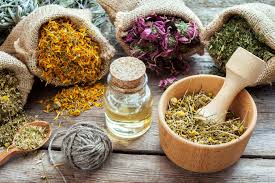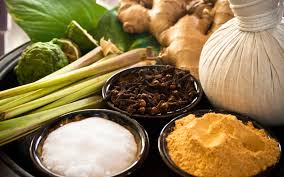
Herbal medicine, also known as botanical medicine or phytomedicine, is the use of plants to treat disease, improve health, and prevent illness.
Herbal medicine has its origins in ancient cultures. It involves the medicinal use of plants to treat disease and enhance general health and wellbeing. Some herbs have potent (powerful) ingredients and should be taken with the same level of caution as pharmaceutical medications.
Herbal medicine is becoming more mainstream as research shows its value in treating and preventing disease. However, herbal medicines can be potentially harmful if not used correctly, and they can interact with other medications.
You should always consult your doctor before taking herbal medicines, and you should never stop taking prescribed medications in favor of herbs without first discussing it with your doctor.
——————————
—–Agency Produces Herbal Medicines For Treatment Of Diabetes, Others——
Prof. Martins Emeje, the Director-General, Nigeria Natural Medicine Development Agency (NNMDA), says the agency has produced four medicines in appropriate dosage forms, in its drive to promote the use of herbal medicines.
He told the News Agency of Nigeria (NAN) in Abuja recently that the four medications were part of activities carried out by the agency in the last one year.
According to Emeje, a professor of Drug Delivery and Nanomedicine, the agency converted natural foods and herbs indigenous to Nigeria to drugs to treat sickle cell, diabetes and slow aging process.
He added that the products, which are organic in nature, were launched on March 8.
He explained that “the medicines are Aberecin, used in the management of Diabetes Mellitus and Namdasan for the management of sickle cell disorder, which is a huge issue in the black population of the world and Nigeria is home to more than four million sufferers.
“We have that product containing at least eight different plants indigenous to Nigeria”, he added.
The director-general also said that the first herbal nano-product in Africa called Nanobere was also developed by the agency, and used in the treatment of Upper Respiratory Tract Infections.
He added that an anti-aging agent called Namdamune was developed by harnessing natural plants and herbs that do revitalisation, build the immune system and is responsible for slowing aging process.
He said “we got all these done in one year and it is not just about health, the significance of this is that Nigeria can develop its own products locally and manufacture locally, and that is medicine security.
“It means that the life of your people is in the hands of your people because the greatest disservice you can do to yourself is to have your own life in the hands of another person.”
He also said that the production of the herbal medicines resulted to job and wealth creation.
“This is because unlike the synthetic products that are imported, the basic materials used in making these medicines are from farms, local plants, animals, insects and sea animals all in Nigeria.
“The ingredients are abundant in the nation and farmers are needed to cultivate the herbs.
“So, you can imagine the millions of people that we need to cultivate one of the plants so by our calculation in producing one of our products, the process from the farm to the final production, we would have employed 3.8 million Nigerians.
“You can then imagine for four products, how many would have been employed?.
“So, if by two years of this administration, we are able to produce 10 medicines, multiply 3.8 million by 10 that’s the number we would have employed”, he said.
Emeje said that the aim of the agency is to use science and technology to innovatively address and put the herbs and plants in a form that they would not just be useful to Nigerians, but to also export them and get foreign exchange for the country.
This, he explained, is because the herbal medicine market alone is predicted to be about five trillion dollars in the next 13 years.
He, however, said that the plan of the agency is to have good agricultural and cultivation research farm in each political ward in the country.
According to him, the agency will establish a herbal manufacturing factory, using the prototype approved by the National Agency for Food and Drug Administration and Control (NAFDAC).
He also said that the agency subjects itself to the evidence-based regulatory approach that NAFDAC is using for products regulation.
Additionally, the agency would establish a garlic research farm in Benue because studies have shown that there is high prevalence of asthma in Benue, he said.
“We will produce medicines for asthma in Benue because we do not want the people in Vandekiya to travel to Makurdi before they can get the products.
“We want them to be accessible to them in Vandekiya. This is the practical way to show renewed hope.”
He said that the process would begin in the 774 local government areas of the country first before cascading to the wards.
On other achievements of the agency, he said medicinal plants used in the treatment of diseases in Nigeria had been documented.
According to him, the documentation is aimed at boosting Nigeria’s traditional medicine sector for optimal performance.
He also said that this would help in addressing some of the challenges the nation’s health sector faced.
“Every plant that is useful in treating one form of disease or the other in Nigeria is documented.
“We are going into full documentation of traditional medicine in Nigeria, all the 774 local governments in Nigeria, we have marked them out.
“We are going to document and do digital database of all traditional medical practitioners in Nigeria, what they do and give to people.
“All of these are aimed at standardisation.”
Emeje said that the project, which had already taken off in Alimosho Local Government Area of Lagos State, involved in going from house to house to get the full statistics needed and that it would cascade to other LGAs in the country.
The News Agency of Nigeria (NAN) reports that NNMDA was established by the Federal Government in 1997 to research, collate, document, develop, promote and preserve knowledge, practice and products of natural medicine.
This is with a view to facilitating its integration into the national healthcare delivery system
——We’ve Turned To God, Traditional Medicine For Healing – Diabetic, Hypertensive Patients ——-

Some diabetic and hypertensive patients say they’ve resorted to praying to God for healing amid the increasing cost of medication for diabetes, hypertension and other illnesses.
For some, they now use local herbs and medicine to manage their ailment.
The patients spoke to the News Agency of Nigeria (NAN) in Lagos on Sunday.
According to them, the increasing cost of medicines have left them in despair and fear of complications from the diseases, saying the alternative is to turn to God for healing.
A 62-year-old retiree, Mrs Agnes Adenike, said that she had uncontrolled blood sugar, blood pressure, and high cholesterol level, which was managed by healthy eating, regular exercise, weight loss and diabetes medication.
“When I started treatment two years ago, I was placed on 1000mg Merck Glucophage, which cost N2000 per pack but now sells for N11, 350; Nifedipine was N800 now goes for N3,500.
“A pack of Lipitor Atorvastatin Calcium 20mg was N3000 now sells for N30,600, Bondomet was N70 per sachet now N400. I use a pack of each medicine per month.
“They said eat healthy, but now a piece of egg goes for N150, a sizeable piece of apple costs N400; the cost of living is choking life out of the living. We are standing by God’s grace.
“My pension is N27,000 per month, and there’s no way I could afford all these. I spoke with my physician about alternative brands of medicines to reduce cost.
“However, after one month of use, I was hospitalised because the alternative drugs weren’t controlling my condition. Upon discharge from the hospital, I’ve resorted to healing service at various churches, months after I’m doing well,” she said.
Similarly, Mr Isaiah Hezekiah, a businessman, said that managing diabetes in the current economic situation was unaffordable for many patients.
“We all meet at the diabetes clinics, and from discussions, I notice that many patients are developing complications from treatment disruption. The drugs are too expensive.
“Even the health insurance aren’t helping; many of them exist on paper only, most of their enrollees are denied access to care and you can’t get the quality drugs needed to survive diabetes.
“I alternate use of my medications with herbs and Holy Communion. My physician disapproves of the practice, but that’s the best I can do for now considering the economic situation,” he said.
Similarly, due to the continuous increase in the prices of medication in the country, some other Nigerians told NAN that they resorted to taking traditional/local medicines including herbs and other alternative therapies to manage their illnesses.
According to them, they can no longer afford their routine drugs the orthodox way, hence embracing traditional medicines.
Mrs Jumoke Ajayi, 50, a diabetic and hypertensive patient, said she could no longer maintain her routine drugs, noting that the prices skyrocketed with a short period.
Ajayi said she takes herbal concoction to sustain her health, hoping that the prices would drop.
“The increase in the prices of drugs started like a joke and today, I can no longer afford the drugs I use to maintain my health.
“The cost of Glucophage, Exforgent sold for N1,000 and 15,000 respectively. But they are currently sold at N3,000 and N35,000.
“I have gone back to my root and started using herbs late last year, to ensure that my health doesn’t turn for the worst.
“I hope the government will do everything to normalise the situation of the country and make drugs more affordable for Nigerians.
Mr Gabriel Afolabi, a businessman, told NAN that he also could no longer single handedly provide drugs for his aged mother.
“I have been the one buying drugs for my mother to manage her Blood Pressure (BP) and rheumatism, but now I can’t do it alone because of the increasing price of drugs.
“At times, she insists on taking herbs because of the cost of drugs
“Government should find a way around this and subsidise the cost of medication for the aged in the country”.
For Mrs Adaeze Achibogu, 65, she told NAN she also had to switch to traditional medicine because of increasing high costs of medication..
She attributed the high cost of drugs to the removal of fuel subsidy and the forex rate.
Also, Mr Michael Okafor said that when he could not buy his drugs again, he was introduced to local herbs or treatment.
He said that with N5,000 a month, he could conveniently get the required local herbs to treat and manage diabetes.
A visit by NAN to a section of the local herbs stall at Ikotun Market , Lagos, revealed that that there were several local herbs for the treatment of diverse health conditions including diabetes and hypertension.
According to Mrs Abiola Ogunsola, a local herb seller (elewe omo), there are various herbs and roots that can be used in the treatment and management of diabetes, depending on the level/stage and type of the diabetes.
Ogunsola said that such herbs and roots included but were not limited to ‘abere (Miracle seed/Huntaria umbellata seed), ewuro (Bitter Leaf/Vernonia amygdalina), ata ire (Alligator pepper/Guinea pepper/Aframomum melegueta), kafura (bark of camphor/menthol/Cinnamomum camphora L),among others.
She said that, of recent, there had been a boost in the market as the foreign exchange had really affected the prices of orthodox drugs.
Commenting on the situation, Dr Oluwajimi Sodipo, Head, Family Medicine Department, Lagos State University Teaching Hospital (LASUTH), said that the exit of some pharmaceutical companies holds wider implications.
According to him, it affects public health initiatives that rely on the companies’ products.
Sodipo noted that their exit over worsening economic conditions and declining revenues had led to scarcity of medicines, increased cost of drugs, disruptions in disease management, and treatment access, which potentially puts patients at risk.
He appealed to the Federal Government to ensure a fair pricing mechanism of life-saving medicine to ensure access to affordable and quality medicines, especially for vulnerable citizens.
Sodipo urged the government to support pharmaceutical companies with funding and favourable macroeconomic policies to enhance local medicine production.
Data from the World Health Organisation showed that 24 million adults are currently living with diabetes, with that number projected to increase to 55 million by 2045.














